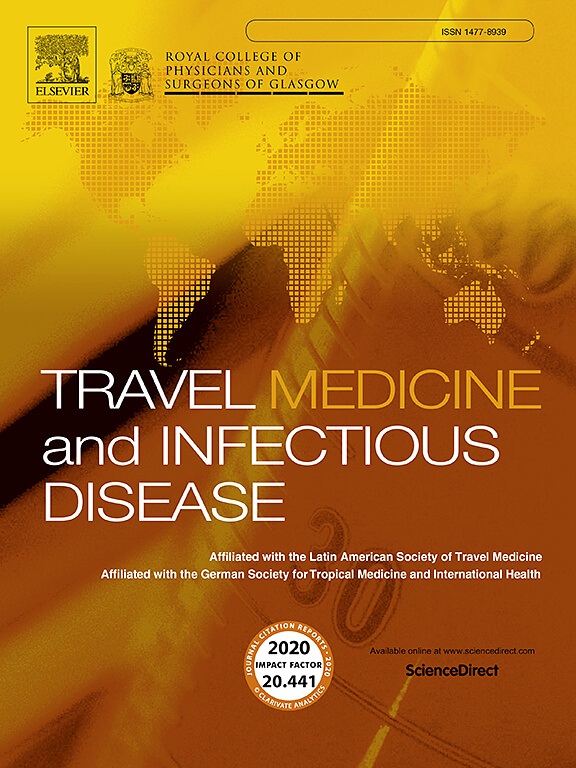气候变化与登革热:印度尼西亚2010-2023年死亡率趋势的14年研究
IF 4.7
3区 医学
Q1 INFECTIOUS DISEASES
引用次数: 0
摘要
背景登革热在印度尼西亚仍然是一个严重的公共卫生问题,近年来死亡病例显著增加。作为一种病媒传播疾病,登革热受环境条件的影响很大,使其对气候变化的影响特别敏感。印度尼西亚受到全球气候变化的严重影响,在管理登革热方面面临越来越大的挑战。本研究旨在调查2010年至2023年印度尼西亚登革热死亡率与气候变量(特别是年降雨量和温度)之间的关系。方法收集印度尼西亚卫生部2010 - 2023年登革热病例二级资料。年降雨量和年气温数据来自印度尼西亚气象、气候学和地球物理委员会,信息来自印度尼西亚116个气象站。采用线性回归分析确定这些变量与登革热死亡率之间的关系。结果年气温与登革热病死率有显著相关性(p = 0.049; R2 = 0.212; 95% CI: 710.85 ~ 2.233)。此外,每年登革热病例与死亡率显著相关(p < 0.001; R2 = 1.075; 95% CI: 0.007-0.010)。然而,年降雨量在本研究中没有发现显著性。结论这些发现强调了监测气候变化及其对公共卫生的影响的重要性,特别是对媒介传播疾病的影响。加强监测和有针对性的干预措施可以减轻这些气候变量对印度尼西亚登革热死亡率的不利影响。本文章由计算机程序翻译,如有差异,请以英文原文为准。
Climate change and dengue Fever: A 14-year study of mortality trends during 2010–2023 in Indonesia
Background
Dengue fever remains a critical public health issue in Indonesia, with a significant increase in mortality cases in recent years. As a vector-borne disease, dengue fever is highly influenced by environmental conditions, making it particularly sensitive to the impacts of climate change. Indonesia, being heavily affected by global climate change, faces increasing challenges in managing dengue fever. This study aims to investigate the association between dengue fever mortality and climate variables, specifically annual rainfall, and temperature, in Indonesia from 2010 to 2023.
Methods
Secondary data on dengue fever cases from 2010 to 2023 were collected from the Ministry of Health of Indonesia. Data on annual rainfall and annual temperature were obtained from the Indonesia Meteorology, Climatology, and Geophysics Council, with information gathered from 116 stations across Indonesia. Linear regression analysis was used to determine the association between these variables and dengue fever mortality.
Results
The analysis revealed a significant association between annual temperature (p = 0.049; R2 = 0.212; 95 % CI: 710.85–2.233) and dengue fever mortality. Additionally, annual dengue fever cases were significantly associated with mortality (p < 0.001; R2 = 1.075; 95 % CI: 0.007–0.010). However, annual rainfall was not found to be significant in this study.
Conclusion
These findings underscore the importance of monitoring climatic changes and their impact on public health, particularly concerning vector-borne diseases. Enhanced surveillance and targeted interventions could mitigate the adverse effects of these climatic variables on dengue fever mortality in Indonesia.
求助全文
通过发布文献求助,成功后即可免费获取论文全文。
去求助
来源期刊

Travel Medicine and Infectious Disease
PUBLIC, ENVIRONMENTAL & OCCUPATIONAL HEALTH-INFECTIOUS DISEASES
CiteScore
19.40
自引率
1.70%
发文量
211
审稿时长
49 days
期刊介绍:
Travel Medicine and Infectious Disease
Publication Scope:
Publishes original papers, reviews, and consensus papers
Primary theme: infectious disease in the context of travel medicine
Focus Areas:
Epidemiology and surveillance of travel-related illness
Prevention and treatment of travel-associated infections
Malaria prevention and treatment
Travellers' diarrhoea
Infections associated with mass gatherings
Migration-related infections
Vaccines and vaccine-preventable disease
Global policy/regulations for disease prevention and control
Practical clinical issues for travel and tropical medicine practitioners
Coverage:
Addresses areas of controversy and debate in travel medicine
Aims to inform guidelines and policy pertinent to travel medicine and the prevention of infectious disease
Publication Features:
Offers a fast peer-review process
Provides early online publication of accepted manuscripts
Aims to publish cutting-edge papers
 求助内容:
求助内容: 应助结果提醒方式:
应助结果提醒方式:


